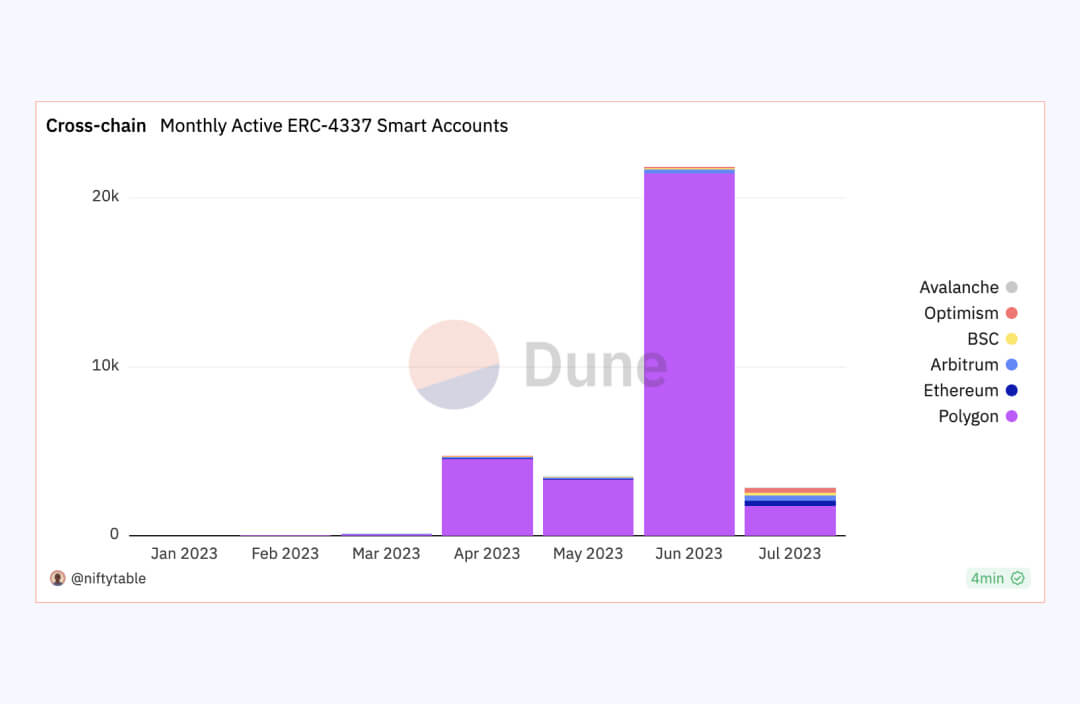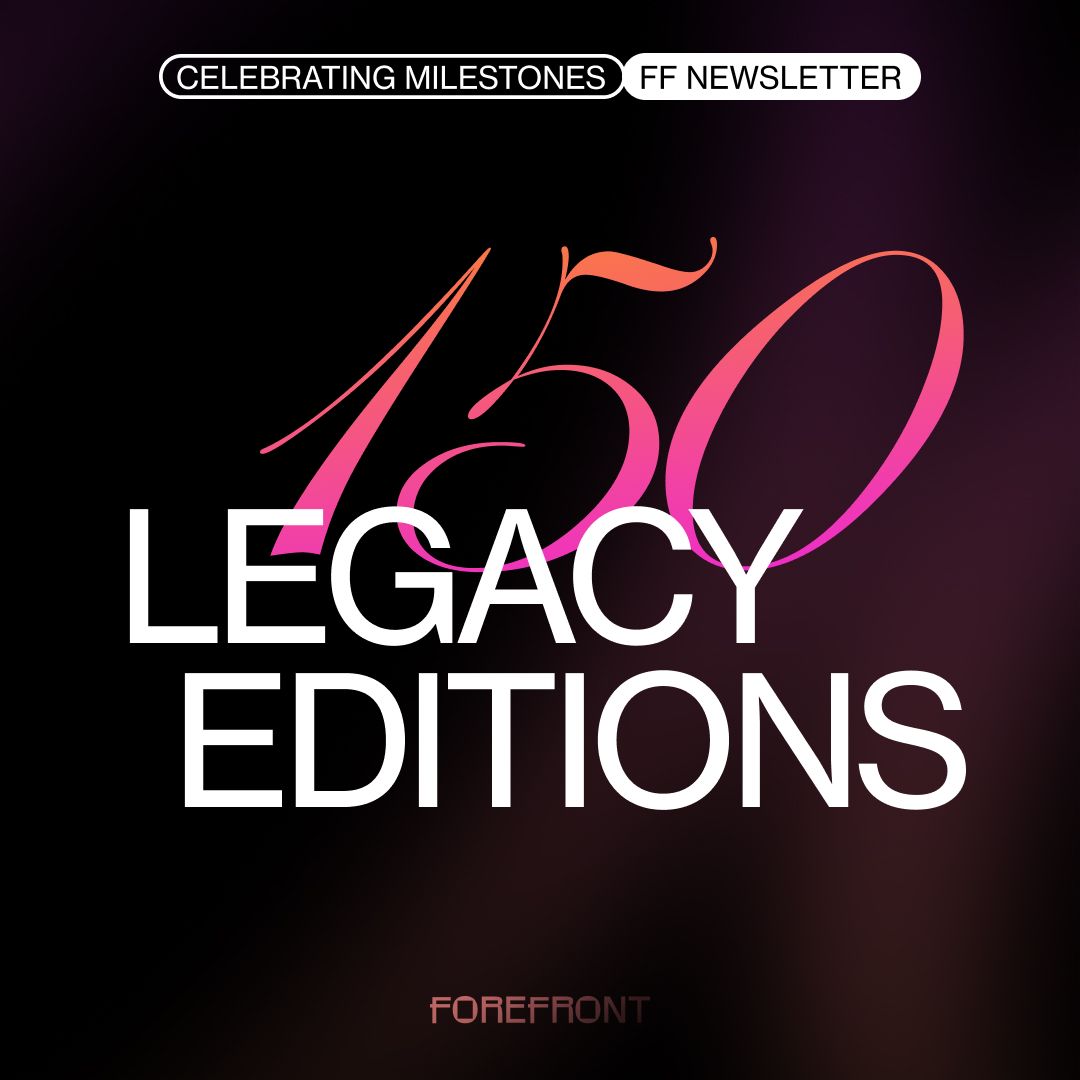Newsletter: More Than Meets The "Eye"
This Week We Cover Twitter (Now X), Worldcoin Public Launch & Vitalik Thoughts On Its BPP, Fed Now Service Goes Live, Andrew Hall On Governance, Deals By Opensea, Plus Market Trends, Mainstream News And Signal TL;DR.
By Forefront - Jul 24, 2023
Good morning and welcome to special edition FF Newsletter. We've hit a HUGE milestone! Forefront Publication is celebrating its 150th edition! We couldn't have done it without our amazing readers like YOU!!
To celebrate we've created a limited edition NFT on Zora, exclusively for our dedicated readers! Collect it now and own a piece of Forefront's history!
Ok back to newsletter, this week we cover Twitter (now X), Worldcoin public launch & Vitalik thoughts on its BPP, Fed Now service goes live, Andrew Hall on governance, Deals by Opensea, plus Market Trends, mainstream news and Signal TL;DR.
It's a packed with major launches and announcement so let's get to it.
👋 Looking for a way to support Forefront? We’re opening up the FF Newsletter to sponsors interested in sharing their company, project, or community with +10,000 of web3’s most curious minds. If you are interested in becoming a sponsor, check out our Sponsorship Page or DM us on Twitter.
Week’s Highlight
It's official: Twitter.com is now X, a massive step toward Elon's dream of the Western SuperApp.
Linda Yaccarino, CEO of Twitter, announced that the plan is for X to deliver "well... everything." She stated that X is the future state of unlimited interactivity -- centered in audio, video, messaging, payments/banking -- creating a global marketplace for ideas, goods, services, and opportunities. "Powered by AI," she says, "X will connect us all in ways we're just beginning to imagine."
We've discussed this before at Forefront. Back in 2021, Nir Kabessa wrote a piece called "The Super DApp Thesis," arguing that "the West's WeChat (an all-in-one app that can do everything) will be a 'Super DApp' consisting of one/few web3 apps/platforms integrating with a growing set of permissionless protocols, standards, and cloud solutions." Elon's Twitter doesn't seem to be heading in the direction of decentralization, instead focusing on bringing as much capability and attention onto the closed platform as possible and restricting the usage of various APIs.
That said, recent feature additions and changes to the platform make sense in the context of a WeChat competitor. Twitter has launched Creator Payments and Tipping, longform video and text, and is restricting the reach of external links. In the context of the X announcement, the goal is clearly to make X an all-in-one home for the new internet in the West.
The opportunity is here for crypto integration, but it seems increasingly likely that a "Super DApp" will not come from Twitter, Meta, or any other large social media player. Instead, it will be a new, crypto-native competitor who has managed to balance decentralization and composability with a strong UX and community. Lens and Farcaster are clearly the players in the lead here.
Take Note. More changes are coming to X. While the decision may seem rash and the reasoning unclear to most, it will be fascinating to observe how Elon and the team navigate the move toward this grand vision.
What's Poppin'
OpenAI's Sam Altman Launches Worldcoin
More than three years ago, Worldcoin was launched with the ambition of creating a new identity and financial network owned by everyone. Today, the rollout began. Worldcoin consists of a privacy-preserving digital identity (World ID) and, where laws allow, a digital currency (WLD) received simply for being human. Countries with less clear crypto regulation, like the US, will not be able to use WLD. You can now download World App, the first protocol-compatible wallet, and reserve your share. After visiting an Orb, a biometric verification device, you will receive a World ID. The experiment is bold, and has obviously received lots of negative backlash over the years around privacy and security concerns. Jack Dorsey has made his critiques clear: "at no time should a corporation or state own any part of the global financial system," he tweeted. Vitalik has also expressed privacy concerns in his latest post.
Web3 aims to disperse power online. Well-designed decentralized and democratically oriented governance systems are vital to its evolution. This post from a16z crypto outlines some key questions any community or company must ask themselves when developing a governance framework, and highlights some context and discussion around each. The answers are rooted in Andrew Hall's research as an academic political scientist with a long-running interest in democratic systems as well as his experience over the last several years studying and working in web3 governance.
Language is a Map The post from Cody Brown discusses the importance of clear terminology in the evolution of digital movements, comparing the shift from "free software" to "open source software" in the 1990s to the current challenges with terminology in the world of cryptocurrency and blockchain technology. In the 1990s, many proponents of free software struggled to communicate their ideology due to the confusion over the term "free", leading to the adoption of the term "open source" for better clarity and widespread acceptance. Now, in 2023, developers and organizations working in crypto face a similar issue with terms like "web3", which can be confusing or negatively perceived. Cody suggests "onchain" as a more practical, tangible term that signifies whether a project is based on the blockchain.
DePIN and DeREN: Toward a Better Classification of Decentralized Infrastructure Networks
Decentralized infrastructure networks---cryptonetworks that leverage token incentives to generate the liquidity to fund physical infrastructure operations---are proliferating fast. This piece from Mason Nystrom differentiates between two key types of decentralized infrastructure networks: Decentralized physical infrastructure networks (DePINs) and Decentralized resource networks (DeRENs). Mason differentiates these two types of networks across three dimensions: resource fungibility, hardware location deployment, and resource creation. Crypto-based resource networks must still compete with their web2 counterparts like AWS and Google. While DePINs and DeRENs can leverage tokens to subsidize initial resource costs, the most successful networks won't compete on price alone, but instead will unlock new demand or expand the market in unique ways.
UniswapX: Empowering DeFi through State-of-the-Art Liquidity Solutions This week, Uniswap announced UniswapX: a new permissionless, open source (GPL), auction-based protocol for trading across AMMs & other liquidity sources. It outsources the complexity of routing to an open network of fillers who compete to fill swaps at the best prices. Over time, it'll give users more liquidity, better prices, MEV protection, & gas-free swapping. Swappers sign an offchain order, which is submitted onchain by fillers who pay gas on swappers' behalf to complete the transaction, making it gas free for swappers. There are concrete plans to make UniswapX cross-chain as well. CoWSwap came out with a tweet saying "imitation is the sincerest form of flattery," insinuating that UniswapX is a copy of their model. While this may be true, competition is always good, and it will be interesting to see how things play out with UniswapX's development and CoWSwap in the future.
Fed Now Payment Service is Live
The U.S. Federal Reserve denies that its new instant payments service, FedNow, is in any way tied to crypto or the digital asset space, but experts say the new system could lay the groundwork for the infrastructure needed for a potential CBDC in the U.S. The Fed on Thursday officially launched the service, which makes the process of sending payments in the U.S. almost instant, as opposed to a few hours or days that sending money from account to account currently takes. There is no FedNow app, but the service can be integrated through bank tools and other financial service providers.
This week, OpenSea introduced Deals: a way to offer your NFTs for theirs securely using the Seaport protocol. Users can offer a combo of their NFTs for a combo of their counterparty's --- and sweeten the deal with WETH. This is a massive step forward from offchain or custodied trades which requires trust in either the counterparty or the custodian. This is great for smaller traders: it enables them to negotiate out of collections they don't want and into new collections without having to sell and buy back in, reducing fees and friction. Great work by the OpenSea team!
Latest on Mainstream...
After a big win for Ripple, the SEC asserted that the XRP case was "wrongly decided" and is signaling toward an appeal. Meanwhile, the current results of the case have sparked new hope for more pragmatic crypto regulation from Congress.
Next, Robert F. Kennedy, Jr. has announced a bold new plan to back the dollar with Bitcoin and end Bitcoin taxes, signaling support for crypto at-large.
On the other hand, Kuwait banned crypto and all virtual asset transactions, a step backward for the Middle Eastern nation. Finally, Nasdaq has halted plans to launch a crypto-custodian business in the US due to the shifting regulatory environment.
Signal TL;DR
Decentralization from first principles
The article "Decentralization from first principles" challenges the idea that decentralization is the ultimate objective of public blockchains. Instead, it highlights corruption-resistance, censorship-resistance, and permissionless access as the primary goals. To achieve these, the article suggests using economic security and decentralization, with potential improvements like validity proofs and reputation systems to enhance efficiency. Decentralization is seen as a means to achieve resistance against censorship and corruption, with a focus on smarter mechanisms for better blockchain performance.
▹ Read - Vitalik on Worldcoin
▹ Opinion - On NFTs
▹ NFTs - Americana Phygital
▹ Research - EthCC Recap
▹ New - Gnosis Visa Card
▹ Interesting - Telegram Crypto Bots
▹ Cool - Doodles IRL Experience
▹ DeFi - Chainlink CCIP
▹ Research - H1 2023 Hacks Report
▹ Tooling - Utopia USDC <> USC
▹ Techy - PBS on L2
◎ Check out Signal for daily top web3 social headlines
Market Trends
The world's leading web3 wallet provider MetaMask has been busy. Days after pushing a major update to its app -- Metamask Portfolio, where you can effortlessly track and manage your holdings and transactions directly within the wallet -- the team came out at EthCC to present an ambitious plan to replace the existing account model using account abstraction and hardware wallets. Simply put, this means "no moh seed phase".
The company has received mixed reactions to this signal and their previous data privacy issues, but regardless, this is a major UX push to onboard billions to crypto, and a clear step towards making crypto more accessible and user-friendly. Emphasizing the security and ease of use while highlighting the potential for financial growth and freedom could resonate with people looking to explore the benefits of crypto.
The future is a world with no more seed phrases for the end-user, with bulletproof security and a high-end user experience that solves the problems wallet users face every day.

For the Culture

—
👋 Looking for a way to support Forefront? We’re opening up the FF Newsletter to sponsors interested in sharing their company, project, or community with +10,000 of web3’s most curious minds. If you are interested in becoming a sponsor, check out our Sponsorship Page or DM us on Twitter.
The information in this newsletter is not intended to constitute legal, financial or investment advice and should not be construed or relied upon as such. Any opinions reflected are the opinion of the author(s) of the newsletter only and not necessarily of Forefront. Please DYOR.
